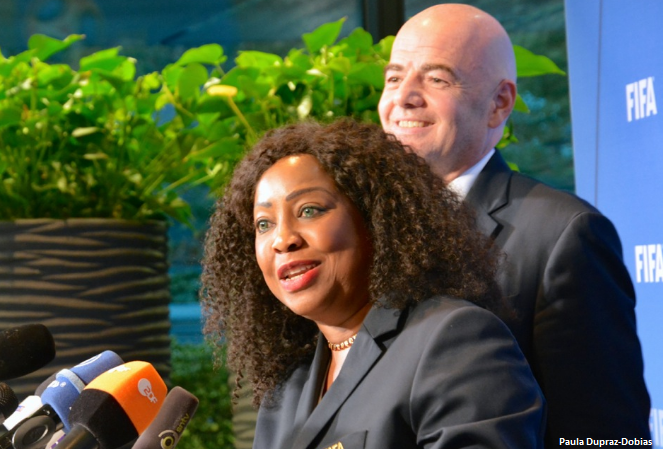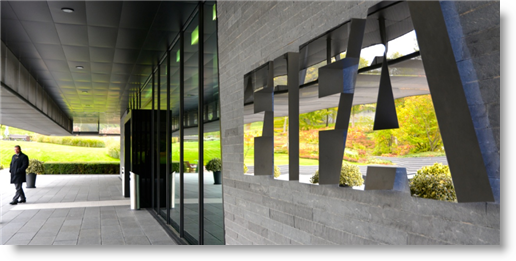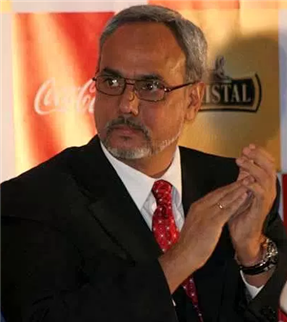
By Paula Dupraz-Dobias —
Four months after her appointment as FIFA’s new secretary general, Senegalese Fatma Samoura – the organization’s first woman and first African in that position – faces many challenges to reform the image of the international football body.
After investigations by US and Swiss authorities into corruption at the organization that plunged FIFA into a deep crisis last year and forced its long-time president Sepp Blatter and deputies out of office, reforms have been announced in an attempt to restore public confidence.
At the close of FIFA’s two-day Council meeting last week – which saw 15 new executive members inducted into the governing body – Samoura highlighted her eagerness to streamline costs, bring the organization out of the red and to see World Cup events shared between several countries.
Her enthusiasm contrasted with her limited participation at a press conference on the meeting’s first day when she sat rather quietly at Infantino’s side as he rolled out the organization’s new strategy, “FIFA 2.0.”
The new document vows to bring better governance and transparency to FIFA, while developing the sport further through new programs and club licensing, and better marketing of the games through conventional and new media.
But Samoura, a former UNDP official in Nigeria, with no previous professional experience in football, is yet to convince critics that she will make a difference for the organization.
“Internally she looks credible,” Guido Tognoni, a former media chief at the organization, commented.
New rules introduced at the time of presidential elections in February mandated a separation of powers between FIFA’s internal management and its revenue-generation division, which generated $4.8 billion during 2014 World Cup in Brazil – and a parity of powers between the president and secretary general which head them.
“The job description was very clear,” explained Tognoni. “Originally more power was to have gone to her. But Infantino didn’t want a powerful CEO.”
Tognoni sees the choice of Samoura as a “politically correct” one. “She knows nothing about football. But you cannot publicly criticize a lady or a black person.”
He said the West African’s appointment came after Infantino’s “coup d’état” – winning the presidential bid after Jordanian Prince Ali —considered by Western associations as a progressive— stepped out of a final voting round in February.
“The old crocodiles are happy that the newly appointed executives at FIFA are not cracking into their old stories.”
But Tokyo Sexwale, South Africa’s association president, who also ran for president, told this journalist that Ms Samoura’s appointment was “one of the greatest things that happened in FIFA in over a hundred years.”
He said that the FIFA’s old boys’ club was “adjusting” to changes, and that the time had come to see “not only females but feminists, like ourselves, pushing the positions. The time of women has arrived, so get used to it.”
He dismissed that her lack of football experience was a weakness. “She is an administrator, she is a professional executive and that is what we need.”
Samoura, now responsible for implementing council decision and running FIFA’s finances and the organization of competitions such as the World Cup, had worked for over 20 years at the United Nations.
From its office in Abuja, Samoura coordinated United Nations humanitarian operations for the region and served as the UNDP’s representative in Nigeria. She oversaw budgets, human resources and procurement, and some 2,000 staff members.

Regarding her appointment in Zurich, the 54 year-old former diplomat said, “The simple fact that an African woman, a Muslim, is the head of the administration is a demonstration that we can make the game into something in which everyone can recognize themselves.”
She said reforms requiring more diversity were already having an effect: “Having a minimum of one woman in every (regional football) confederation is really an opening of the minds in the world of football.”
She said it was “dear to my heart” to see the number of women playing football worldwide to double to 60 million, and more funding going to women.
“If (member associations) consume all the ($1.2 million in FIFA) funds just for men’s football there will be an issue. We have made that very clear.”
In September, former chief executive of Samoa’s football federation, New Zealander Sarai Bareman, was appointed to the new position of chief women’s football officer at FIFA.
Evelina Christillin, a former Italian athlete who is one of six new women on the council, also lauded Samoura’s arrival. She said FIFA needed an experienced administrator to manage accounts at “such a big machine. Coming from the United Nations she knows how to deal with complicated issues.”
She said Samoura’s nomination “may be politically correct, it may be a gender issue or a race issue, but it is a good choice. I am very proud of her.”
Meanwhile, Samoura made it clear that there was lots of work to be done.
Regarding corruption charges against former FIFA officials, she told the Peruvian Times that “it is important that we take stock of mistakes of the past which would allow us to correct them, and to be more positive in the way we are looked at by the outside world.”
Samoura said her experience at the UN during which it had to reform its administration to become more coherent “is a vision that I will be bringing on board.”
“We have challenges. Even in a family where you have more than two children, there are challenges, and you have to find a good balance when making decisions.”
“At FIFA where you have 211 member associations, some people resist change. We are facing challenges to increase and expand the teams going to the World Cup in 2026, but with dialogue and consensus, we will be successful.”
 Peru’s former FIFA official charged with corruption
Peru’s former FIFA official charged with corruption
Meanwhile, Manuel Burga, the former head of the Peruvian football association (2002-2014), remains in prison in Lima awaiting extradition to the United States. Last month law authorities set a November 2017 date for the start of the trial, expected to involve as many as seven defendants in New York.
Burga, as a member of the South American Football Confederation (Conmebol), is charged with money laundering, electronic fraud, and organized fraud and conspiracy in the negotiations for transmission rights of the FIFA-recognized tournaments of Copa Libertadores and Copa America. In the U.S., he and other Conmebol members could face a sentence of 20 years for organized crime.
This week, Lima’s Superior Court turned down Burga’s appeal against extradition to the U.S. , which his lawyer Cesar Nakasaki presented on the grounds that conspiracy is not identified as a crime in Peru.

 Peru’s former FIFA official charged with corruption
Peru’s former FIFA official charged with corruption



